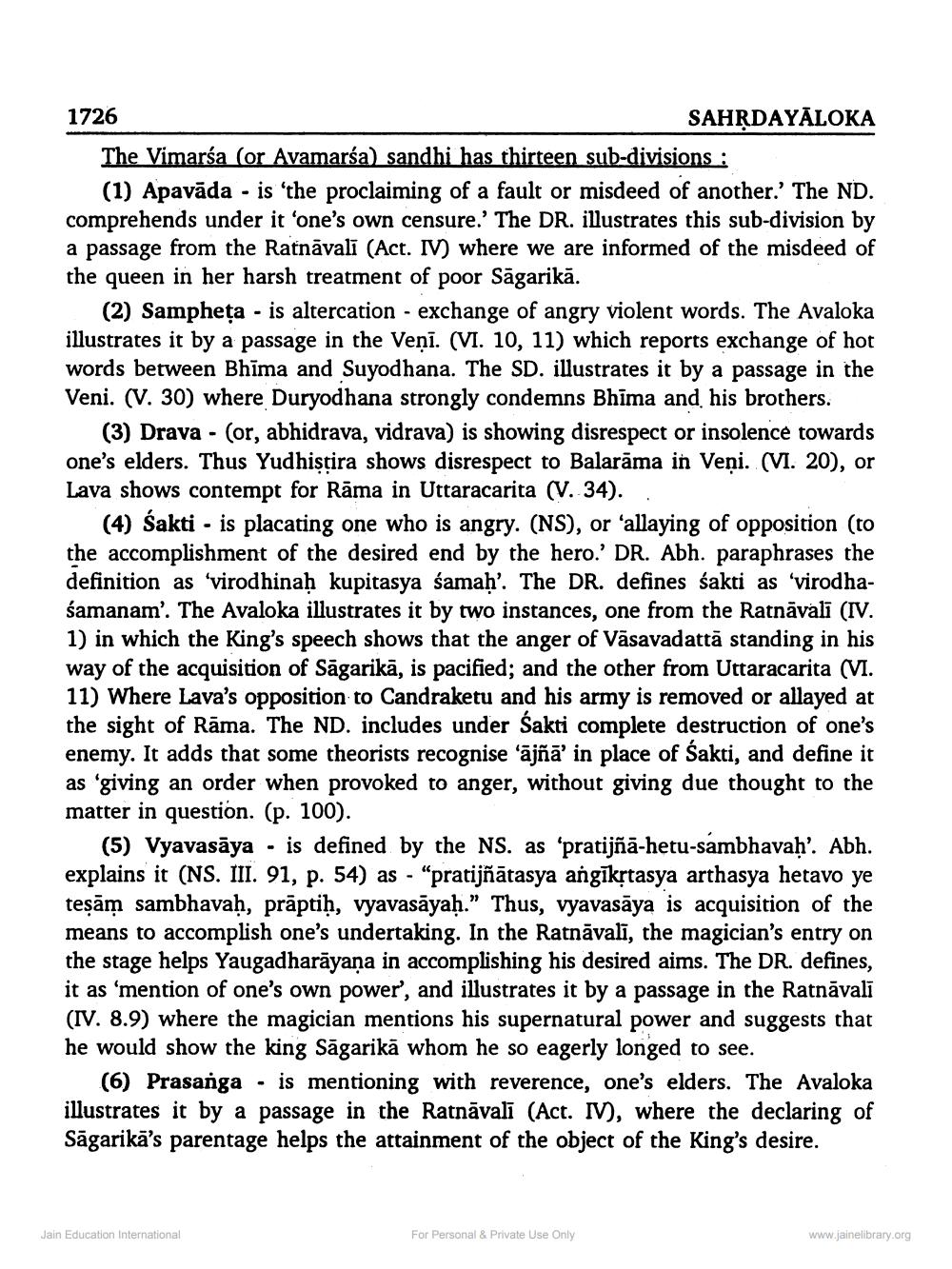________________
1726
SAHRDAYĀLOKA The Vimarśa (or Avamaría) sandhi has thirteen sub-divisions :
(1) Apavāda - is 'the proclaiming of a fault or misdeed of another.' The ND. comprehends under it 'one's own censure.' The DR. illustrates this sub-division by a passage from the Ratnávali (Act. IV) where we are informed of the misdeed of the queen in her harsh treatment of poor Sagarikā.
(2) Sampheta - is altercation - exchange of angry violent words. The Avaloka illustrates it by a passage in the Venī. (VI. 10, 11) which reports exchange of hot words between Bhīma and Suyodhana. The SD. illustrates it by a passage in the Veni. (V. 30) where Duryodhana strongly condemns Bhīma and his brothers.
(3) Drava - (or, abhidrava, vidrava) is showing disrespect or insolence towards one's elders. Thus Yudhistira shows disrespect to Balarāma in Veni. (VI. 20), or Lava shows contempt for Rāma in Uttaracarita (V. 34).
(4) Sakti - is placating one who is angry. (NS), or 'allaying of opposition (to the accomplishment of the desired end by the hero.' DR. Abh. paraphrases the definition as 'virodhinah kupitasya samah'. The DR. defines sakti as 'virodhasamanam'. The Avaloka illustrates it by two instances, one from the Ratnávali (IV. 1) in which the King's speech shows that the anger of Vāsavadattā standing in his way of the acquisition of Sāgarikā, is pacified; and the other from Uttaracarita (VI. 11) Where Lava's opposition to Candraketu and his army is removed or allayed at the sight of Rāma. The ND. includes under Sakti complete destruction of one's enemy. It adds that some theorists recognise 'ājñā’ in place of Sakti, and define it as 'giving an order when provoked to anger, without giving due thought to the matter in question. (p. 100).
(5) Vyavasāya - is defined by the NS. as 'pratijñā-hetu-sambhavaḥ. Abh. explains it (NS. III. 91, p. 54) as - "pratijñātasya angīkstasya arthasya hetavo ye tesām sambhavah, prāptih, vyavasayah.” Thus, vyavasāya is acquisition of the means to accomplish one's undertaking. In the Ratnāvalī, the magician's entry on the stage helps Yaugadharāyana in accomplishing his desired aims. The DR. defines, it as 'mention of one's own power', and illustrates it by a passage in the Ratnāvali (IV. 8.9) where the magician mentions his supernatural power and suggests that he would show the king Sāgarikā whom he so eagerly longed to see.
(6) Prasanga • is mentioning with reverence, one's elders. The Avaloka illustrates it by a passage in the Ratnāvali (Act. IV), where the declaring of Sāgarikā's parentage helps the attainment of the object of the King's desire.
Jain Education International
For Personal & Private Use Only
www.jainelibrary.org




